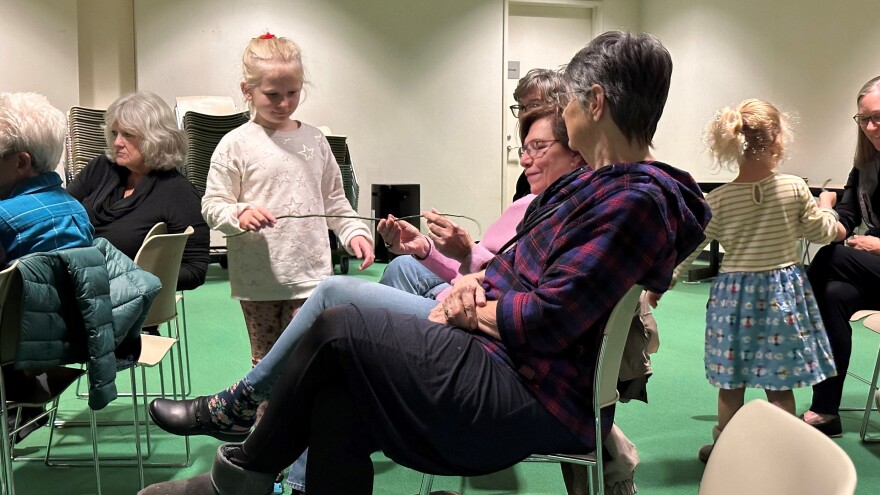- The Allentown Public Library hosted a meeting discussing native plants and pollinators on Saturday afternoon
- Penn State Extension Master Gardener Becky Short hosted a discussion on how local plants are vital to the environment, along with the pollinators who survive through a mutualistic relationship
- Short also offered advice on where to get native plants and seeds and how to contribute to the cause no matter where you might live
ALLENTOWN, Pa. — Visitors at the Allentown Public Library got a chance to learn about the vital plants and pollinators that make up the local ecosystem during a special session held Saturday afternoon.
Hosted by the League of Women Voters of Lehigh County and the Allentown School District Foundation, the program featured a presentation on the importance of native plants and pollinators by certified Penn State Extension Master Gardener Becky Short – along with some assistance from her granddaughters Violent and Iris DePoe, ages seven and five.
Aimed at both children and adults alike, the event was arranged to spread the word on environmental issues that impact those plants and insects vital to the environment, League of Women Voters’ Julie Ambrose said.
“I've been interested in native plants for many, many years, especially now that I have grandchildren because I understand this state of the earth that they are inheriting."Penn State Extension Master Gardener Becky Short
Being that environmental initiatives are a core component of the League of Women Voters’ platform, the presentation helped attendees understand “the connection between their own quality of life and the environmental issues in their communities so that they become more aware, and then hopefully take action to help our communities improve for everyone's health,” Ambrose said.
“The League of Women Voters is trying to increase awareness [of] environmental issues, and we were able to get a grant to put on this event. The heart of it will be an educational program through the Master Gardeners at Penn State Extension,” Ambrose said.
“We'll have an arts and crafts component for the children to learn about pollinators and the importance of pollinators in our world and in our communities and our neighborhoods. And we also purchased quite a number of books for the permanent collection here at the library that will be available to people anywhere to be able to check them out."
League of Women Voters’ Director of Environmental Policy Ellen Iobst said one of the most important elements of the presentation and event focused on the impact each and every individual can have on the environment, and how those interactions can lead to significant issues if not acknowledged.
“I think one of the things about the environment is people think that they don't have an impact when they really do. The reason we're pushing native plants is [that] native plants have a deeper root system and actually help with stormwater runoff, which is one of the county's biggest issues, and having the native plants and the pollen, the pollinators help create our food and help with the whole ecosystem of the environment,” Iobst said.
Iobst added “This is an issue that isn’t going away,” noting climate change is having a significant effect on the world of pollinators and plants. It’s also integral to understand these issues, Iobst noted, to make an informed decision when it comes time to vote — after all, the decisions your representatives make can carry a huge significance when it comes to local ecosystems.

The League of Women Voters also had a voter registration table set up at the presentation to help get more people involved in the world of plants, pollinators and the politics that impact them.
When Short took the reins of the presentation, she explained the concept of native plants — those plants that existed in an area prior to the arrival of settlers — and their current status, which has been largely affected by the presence of humans.
“The problem with native plants today is we have so many more people, and people need places to live, people need stores, we need roads to get there. And as a result, our native habitats are shrinking at an alarming rate. We have lost two-thirds of our wildlife on our earth. And if we don't do something collectively to restore that, we are going to really have a problem,” Short said.
Tied to those plants are pollinators, which have traversed evolution together, creating a connection that not only is integral to each other’s survival but the livelihood of just about all living beings.
As Short explained, the Lehigh Valley has hundreds of species of bees and over 4,000 species of plants — less than half of those plants being native to the area. Bees are the “best” pollinators, Short said, followed by flies and moths, along with many other insects and even some birds.
Beyond supporting insects and providing food, native plants also produce oxygen and store carbon, improve water quality, create strong, deep root structures that prevent flooding and stormwater issues, and in the past, they were often used for medical purposes.
Short presented several plants plucked from her own garden, offering up explanations as to their role in the world of pollination and medicine.
“This is called Joe Pye weed. If you've never heard of Joe, Joe Pye was a Native American in New England. and he used to use this plant to treat dysentery and cholera. It’s an extremely important pollinator plant as well,” Short said.
Some of those incredibly important plants are in danger of disappearing, Short said, though they can be helped if local residents grow them to help out the local ecosystem. In particular, milkweed plants are vital to the monarch butterfly, which only lays its eggs on that plant.
“We all need to put milkweed in our gardens. And that's how we're going to save the monarchs truly,” Short said.
Fielding some questions from the crowd, Short went on to recommend a few locations for procuring native plants and seeds — Edge of the Woods Native Plant Nursery in Orefield, along with Prairie Moon Nursery and Ernst Conservation Seeds — and how to add native plants to your home no matter where you live.
Short advised those who live in a city without much green space can still make a small difference with potted plants, while those with lawns can go all-out and convert their lawns to meadows, which require little upkeep and bolster the local plant and pollinator environment.
The key, Short said, is to be aware of the issue and take whatever action you can — even if that’s just planting some milkweed in a pottery on your deck. After all, even a little effort can go a long way toward helping a complex ecosystem that needs a bit of help from the humans who have impacted it so very much.
“I've been interested in native plants for many, many years, especially now that I have grandchildren because I understand this state of the earth that they are inheriting. And we all need to get the message out to take better care of it,” Short said, adding those who are interested in helping native plants and pollinators can get plenty of vital information via the Penn State Extension Master Gardner website.


